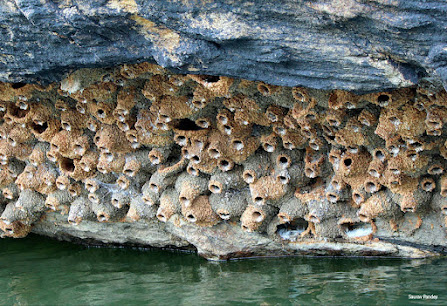STAYING WITH THE TROUBLE
Donna Haraway offers the term Chthulucene to refer to our age as "urgent times." She puts this term concerning Anthropocene and Capitalocene. The term Anthropocene was introduced in social sciences to refer to growing evidence for the transformative effects of human activities on the earth. Haraway's "staying with the trouble" is a response to the reactions towards the horrors of the Anthropocene and the Capitalocene, such as "game over" or "technology will save us." Haraway states that "In urgent times, many of us are tempted to address trouble in terms of making an imagined future safe, of stopping something from happening that looms in the future, of clearing away the present and the past in order to make futures for coming generations." Her proposition of "staying with the trouble," does not require such a relationship to times called the future. She suggests learning to be genuinely present instead of swinging between the awful pasts and apocalyptic or salvific futures. She identifies humans and non-humans as "mortal critters" attached to countless compositions of places, times, matters, and meanings. Unlike the dominant dramas of Anthropocene and Capitalocene discourse, human beings are not the only essential actors in the Chthulucene. Her primary position is that we (as humans and non-humans) require each other in unexpected collaborations and combinations in a hot compost pile.
As the process and practice of Chthulucene, she offers SF. SF stands for science fiction, speculative fabulation, string figures, speculative feminism, science fact, so far. She puts SF as a way of becoming with each other in surprising relays; "it is a figure for ongoingness in the Chtulucene."
She also offers a way of thinking and acting: The Tentacular Thinking. The tentacular ones make attachments and detachments; they make cuts and knots; they make a difference; they weave paths and consequences but not determinisms; they are both open and knotted in some ways.
The tentacular are not disembodied figures; they are cnidarians, spiders, fingery beings like humans and raccoons, squid, jellyfish, neural extravaganzas, fibrous entities, flagellated beings, myofibril braids, matted and felted microbial and fungal tangles, probing creepers, swelling roots, reaching and climbing tendrilled ones. Tentacularity is about the life lived along lines—and such a wealth of lines—not at points, not in spheres.
The Crochet Coral Reef project by Christine Wertheim, Margaret Wertheim, and the Institute For Figuring might be an example of Haraway's propositions. It is an artwork responding to climate change, an exercise in applied mathematics, and a wooly experiment in evolutionary theory.




Where the word "Chthulu" comes from might also be worth investigating. Why she chose to identify these "urgent times" with that imaginary creature.
YanıtlaSilI am not sure whether Harraway addresses this at all, but these events are manufactured and quite intentionally so, at that. To provoke fear, anxiety in the population in order to generate a specific outcome which is that fearful populations are very easy to manipulate and control. And from my personal life experience I can tell you that it has been implemented to high success for as long as I have been around through many different narratives - and never more so than in the very recent past leading into right now. So, is she offering the chthulucene as a panacea to what seems to me to be the real horror - namely "State" (or rather "Power" - because it isn't really States that do this, it is the Corporations and NGOs that operate behind the State mechanisms that are the real culprits) induced Perpetual Fear?
YanıtlaSilYou can read a highly sanitized and summarized version of this, that obviously (it is wikipedia, after all, what do we expect?) reduces all of it to certain periods and events here: https://en.wikipedia.org/wiki/Strategy_of_tension At the end of it there is a list of some techniques that are used for creating a strategy of tension and some of those links lead to more interesting entries.